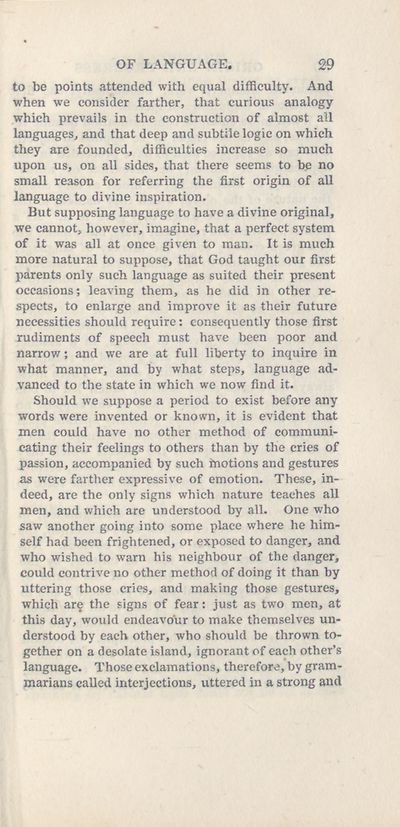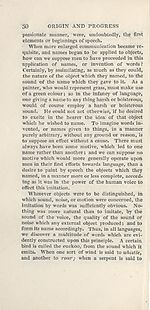Education > Essays on rhetoric
(57)
Download files
Complete book:
Individual page:
Thumbnail gallery: Grid view | List view

OF LANGUAGE,
29
to be points attended with equal difficulty. And
when we consider farther, that curious analogy
which prevails in the construction of almost all
languages, and that deep and subtile logic on which
they are founded, difficulties increase so much
upon us, on all sides, that there seems to be no
small reason for referring the first origin of all
language to divine inspiration.
But supposing language to have a divine original,
we cannot, however, imagine, that a perfect system
of it was all at once given to man. It is much
more natural to suppose, that God taught our first
parents only such language as suited their present
occasions; leaving them, as he did in other re¬
spects, to enlarge and improve it as their future
necessities should require: consequently those first
rudiments of speech must have been poor and
narrov/; and we are at full liberty to inquire in
what manner, and by what steps, language ad¬
vanced to the state in which we now find it.
Should we suppose a period to exist before any
words were invented or known, it is evident that
men could have no other method of communi¬
cating their feelings to others than by the cries of
passion, accompanied by such fnotions and gestures
as were farther expressive of emotion. These, in¬
deed, are the only signs which nature teaches all
men, and which are understood by all. One who
saw another going into some place where he him¬
self had been frightened, or exposed to danger, and
who wished to warn his neighbour of the danger,
could contrive no other method of doing it than by
uttering those cries, and making those gestures,
which are the signs of fear: just as two men, at
this day, would endeavour to make themselves un¬
derstood by each other, who should be thrown to¬
gether on a desolate island, ignorant of each other’s
language. Those exclamations, therefore, by gram¬
marians called interjections, uttered in a strong and
29
to be points attended with equal difficulty. And
when we consider farther, that curious analogy
which prevails in the construction of almost all
languages, and that deep and subtile logic on which
they are founded, difficulties increase so much
upon us, on all sides, that there seems to be no
small reason for referring the first origin of all
language to divine inspiration.
But supposing language to have a divine original,
we cannot, however, imagine, that a perfect system
of it was all at once given to man. It is much
more natural to suppose, that God taught our first
parents only such language as suited their present
occasions; leaving them, as he did in other re¬
spects, to enlarge and improve it as their future
necessities should require: consequently those first
rudiments of speech must have been poor and
narrov/; and we are at full liberty to inquire in
what manner, and by what steps, language ad¬
vanced to the state in which we now find it.
Should we suppose a period to exist before any
words were invented or known, it is evident that
men could have no other method of communi¬
cating their feelings to others than by the cries of
passion, accompanied by such fnotions and gestures
as were farther expressive of emotion. These, in¬
deed, are the only signs which nature teaches all
men, and which are understood by all. One who
saw another going into some place where he him¬
self had been frightened, or exposed to danger, and
who wished to warn his neighbour of the danger,
could contrive no other method of doing it than by
uttering those cries, and making those gestures,
which are the signs of fear: just as two men, at
this day, would endeavour to make themselves un¬
derstood by each other, who should be thrown to¬
gether on a desolate island, ignorant of each other’s
language. Those exclamations, therefore, by gram¬
marians called interjections, uttered in a strong and
Set display mode to:
![]() Universal Viewer |
Universal Viewer | ![]() Mirador |
Large image | Transcription
Mirador |
Large image | Transcription
| Antiquarian books of Scotland > Education > Essays on rhetoric > (57) |
|---|
| Permanent URL | https://digital.nls.uk/113760176 |
|---|
| Description | Thousands of printed books from the Antiquarian Books of Scotland collection which dates from 1641 to the 1980s. The collection consists of 14,800 books which were published in Scotland or have a Scottish connection, e.g. through the author, printer or owner. Subjects covered include sport, education, diseases, adventure, occupations, Jacobites, politics and religion. Among the 29 languages represented are English, Gaelic, Italian, French, Russian and Swedish. |
|---|

